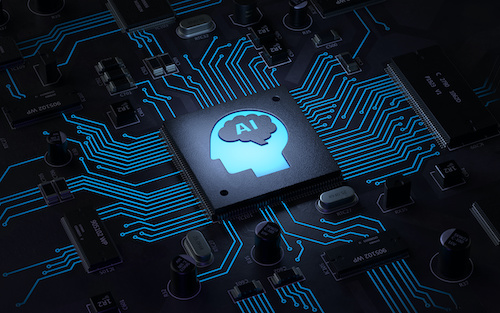Key points:
- It’s essential that the edtech industry and education leaders work together on AI use
- Transparency and equity are key
- See related article: 5 positive ways students can use AI
- For more news on AI in education, visit eSN’s Digital Learning page
- Everything You Need To Know About AI In Education
A new framework intends to guide the edtech industry’s implementation of AI in education in a purpose-driven, transparent, and equitable manner that enables critical tools for personalized and enhanced learning experiences and improved assistive technologies.
Released at an October event on Capitol Hill, the Software & Information Industry Association (SIIA), the leading trade association for the business of information, released Principles for the Future of AI in Education, which will help the edtech industry as it works alongside educators during AI-infused learning.
The seven principles are:
- AI technologies in education should address the needs of learners, educators, and families.
- AI technologies used in education should account for educational equity, inclusion and civil rights as key elements of successful learning environments.
- AI technologies used in education must protect student privacy and data.
- AI technologies used in education should strive for transparency to enable the school community to effectively understand and engage with the AI tools.
- Companies building AI tools for education should engage with education institutions and stakeholders to explain and demystify the opportunities and risks of new AI technologies.
- Education technology companies and AI developers should adopt best practices for accountability, assurance, and ethics, calibrated to mitigate risks and achieve the goals of these principles.
- The education technology industry should work with the greater education community to identify ways to support AI literacy for students and educators.
“With AI being used by many teachers and educational institutions, we determined it was critical to work with the education technology industry to develop a set of principles to guide the future development and deployment of these innovative technologies,” said Chris Mohr, President, SIIA. “Partnering with teachers, parents, and students will be critical to improving educational outcomes, protecting privacy and civil rights, and understanding of these technologies. I commend our member companies who embraced this initiative to collaborate and for their commitment to support our children and teachers.”
Industry leaders applauded the move:
“We commend SIIA’s AI principles as they underscore the importance of purposeful, transparent and equitable implementation of AI technologies in education. At Renaissance, we believe in harnessing the power of technology to accelerate learning for all students, and these principles resonate deeply with our mission,” said Jonathan Medin, Vice President of Psychometrics, Research, Learning Sciences and Innovation at Renaissance. “The guidelines align with our approach to integrating AI to enhance education and provide a framework for a future where AI technologies drive positive educational outcomes in a manner that is understandable and accessible to all. We recognize these principles’ significance in shaping AI’s trajectory in education and are committed to upholding them in our work to accelerate learning for all.”
“As educators, we understand AI technologies’ transformative potential in enhancing educational experiences. We wholeheartedly support the principles of transparency and equity that SIIA’s guidelines emphasize. Sibme AI operates with transparency at its core, ensuring that educators comprehend the methodology behind the insights they receive. By aligning our efforts with SIIA’s principles, we aim to amplify the positive impact of AI in education while fostering an effective, inclusive, and ethically sound learning environment,” said Dave Wakefield, Founder and Chief Executive Officer of Sibme.
“At Alongside, we embrace and applaud SIIA’s new principles that pave the way for the future of AI in education. As pioneers in scalable mental health solutions for students, we recognize the transformative potential at the intersection of technology and education and the risks involved,” said Jay Goyal, Chief Executive Officer of Alongside. “These principles resonate deeply with Alongside as we have witnessed how technology can act as a bridge, connecting students with the guidance they need to flourish emotionally and academically. We believe that every student, regardless of their background or circumstances, should benefit from low cost, personalized care, which AI can enable. With the new principles as a guiding beacon, we are inspired to continue refining and enhancing our solutions to create an even more impactful and equitable educational experience for students.”
The principles were developed by the SIIA AI in Education Steering Committee, which includes AllHere, ClassDojo, Cengage, D2L, EdWeb.net, GoGuardian, InnovateEDU, Instructure, MIND Education, McGraw Hill and Pearson.
“AI and kids’ privacy have dominated the conversation in Congress and in the states this year,” said Sara Kloek, Vice President, Education and Children’s Policy, SIIA. “As the trade organization representing the leading companies in ed tech, it is our mission to advance the responsible use of AI to enhance a learner’s educational experience while at the same time protecting their privacy, promoting educational equity, upholding civil rights, and developing important skills for the future.”
At the event, Sen. Mike Rounds (R-SD) and Kristina Ishmael, Deputy Director, Office of Education Technology, U.S. Department of Education and Alberto M. Carvalho, Superintendent of Los Angeles Unified School District presented remarks. Two panel discussions were also conducted.
The panel AI in the Classroom: What is it? How is it Made? featured Joanna Smith-Griffin, CEO & Founder, AllHere; Teddy Hartman, Senior Director of Privacy & Data Policy, GoGuardian; Brigid Evans, Director of Government Relations, Pearson and Jonathan Medin, Vice President, Psychometrics, Research, Learning Sciences & Innovation, Renaissance Learning.
The panel Perspectives from the Education Community featured Pat Yongpradit, Chief Academic Officer, Code.org and Lead of TeachAI; Joseph South, Chief Innovation Officer, ISTE; and Erin Mote, Co-Founder and Executive Director, InnovateEDU and EdSafe AI, Alliance Leader.
This press release originally appeared online.
- Friday 5: Virtual field trips - April 26, 2024
- Google, MIT RAISE launch no-cost AI training course for teachers - April 26, 2024
- 4 ways to support work-based learning - April 23, 2024

